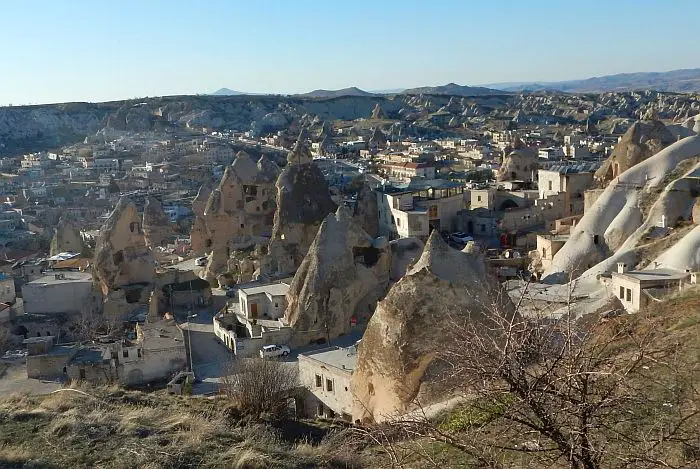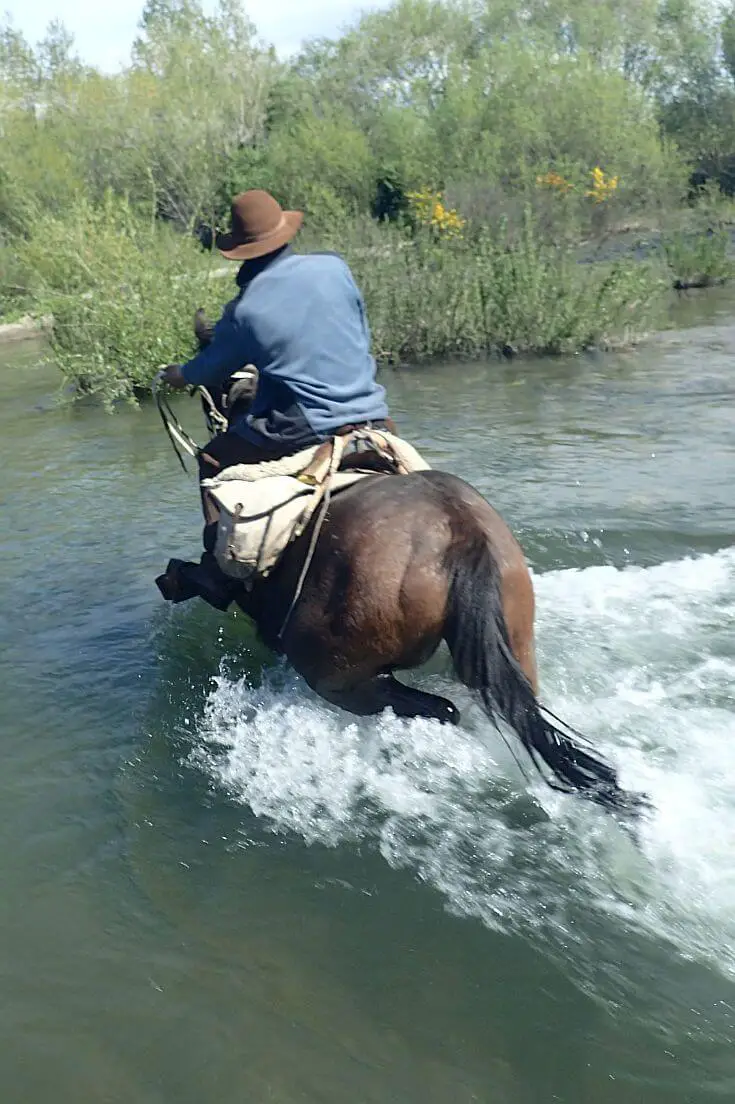Being Fit for Adventures is Being Fit for Life
Story and photos by Julia Hubbel
Why training for the Big Adventure isn't just about a summit photo.

The purple Honda CRV left the ground at speed, completing a barrel roll in midair.
I watched with mild fascination, my hands at ten and two on the steering wheel. When the car slammed into the pavement the driver's side, I watched the windshield crumple a half second before the safety bags exploded from all sides. Vaguely I registered that the window to my right was crushed.
The car stopped, upright.
I pushed out the shattered glass, climbed out the driver's side window, and started searching the road for my Day-Timer. After all, cops need ID when you have a car accident.
 My car had come to rest blocking opposing traffic. It's a small miracle that, due to Covid, there was almost no traffic between Twin Falls and Boise that afternoon. I was the only one standing at the roadside, bleeding into the asphalt from a few lacerations on my forehead, trying to find the bits of ID that my airborne loop-de-loop had scattered to the winds that July afternoon.
My car had come to rest blocking opposing traffic. It's a small miracle that, due to Covid, there was almost no traffic between Twin Falls and Boise that afternoon. I was the only one standing at the roadside, bleeding into the asphalt from a few lacerations on my forehead, trying to find the bits of ID that my airborne loop-de-loop had scattered to the winds that July afternoon.
My car was a pancake. I wasn't.
As a first responder checked my pulse (80 bpm), I took a deep breath. There were some spectacular bruises. I had—but didn't know it at the time—an open fracture on the knuckle of my left hand.
I wasn't upset. Crying. Or shaking. In fact, if anything I was annoyed, partly because I probably mashed almost everything in my car. Since I was moving to Eugene from Denver, my car was completely full. And now totaled.
Also because I had just layered another bit of complexity to an already complex year. Only six days prior I'd been released from the hospital in Denver after kidney stone surgery. That was, in fact, why I had flipped my car at 65 mph. Apparently, they had missed one.
This is hardly the first time I've been bleeding or lacerated or busted up. This would be my twenty-second concussion. Not a typo.
I find this stuff pretty funny. But that's only because I'm still standing. The only reason I am still standing is that I never stop training.
I'm not just in training for my Next Big Adventure. I'm in training for life.
Why should we exercise?
In 2017 I was on my way to Spain. As I liked to do in those days when we actually spoke to each other on airplanes, I made friends with a couple sitting next to me. They were accompanied by a big group of folks who had all retired, or were retiring from, the same firm. Some kind of cruise, they said.
I was heading off to ride horses in Almeria, Spain. Then again in Cappadocia, Turkey. Later than year, an extended riding trip in Kazakhstan. I'd been in training for years at this point.
The woman told me that they were interested in doing some kayaking. "Great," I offered. "Did you guys do any fitness training?"
Both of them gave me that blank, deer-in-the-headlights look. It had never occurred to them, apparently, to prepare for a physical adventure.
Nor had any of the rest of their group, desk jockeys to a person. Not an athlete among them. To be fair, I'm not either. Well, put more fairly, my brother got the grace genes in the family. I'm about as athletic and graceful as a dyslexic camel. A drunk dyslexic camel, at that. However, I am determined.
Being ex-military, I also fully understand the critical importance of being what we referred to as mission-ready. That means, since I do adventure travel for a living, I am always training. Okay, that's any time I'm not recovering from an injury. At that point I train my jaw muscles for serious munching during rehab. But beyond that, I am prepping for the Next Big Trip.
These retirees hadn't even considered the possibility that their aging bodies (all were past 60, as I am) might not be able to live up to any demand they placed on themselves. So many of us have an internal and at times, badly skewed notion of what we can do, based in large part on a body we no longer inhabit. This is how we get seriously injured. Or put others in danger. Or die.
We age in place, often at desk chairs. Then when we finally have both the time and dime to go play, we may run the risk of finding out the hard way that the body is simply not up to the task.

Being out of training can bite us hard
This most certainly isn't limited to the young. I was in southern Patagonia, watching many young people struggle to hike around glaciers. Nearby, one 70-year-old woman was scrambling like a nimble spider up the ice fall during an ice climbing demonstration. No, she wasn't the instructor.
There's something to that. It's not by accident that people can do pretty amazing things late in life. What informs their actions, however, is that they train. Not just for their eighties, but for life in full right now.
Yet increasingly, the adventure travel world, pre-Covid, has seen a huge increase in folks taking on challenges for which they are woefully unprepared. Not just physically, but in all other ways as well. The ability to handle adversity in the world's wild places is key not only to having fun, but also survival if things go south.
Also while in Patagonia I was doing a three-day kayaking trip to see the Southern Right whales and their babies. My kayaking partner bonked after a very short time and struggled when we had to navigate heavy waves. She was half my age, but barely a third of my fitness level.
We can often make the tactical error that simply because we're young, we're strong and fit. That's a bad assumption.
Biting off more than we can chew
One place the world has seen a huge increase in untrained folks taking on Big Challenges They Shouldn't, like mountain climbing. Not technical climbing, but hiking, as with Kilimanjaro or Everest. I've done both Kili and the Everest Base Camp. I'm savvy enough to know that I have no business on Everest proper. Not only do I not have the money, I don't have the skills. More importantly, I don't suffer the hubris of those who decide to give it a go without serious preparation.

Each year, the Everest summit conga line grows, swelled by ranks of rank rookies who have no business clogging the trails when experienced, competent climbers can't move swiftly enough to the top. Last season a great many of those folks got very sick, and in 2019, 11 of them died. This is what comes of not training enough. Regular training, the kind that you and I might commit to in order to take on Mt. Kenya, for example, is what prepares us for life, in ways we can't possibly anticipate.
Sometimes less lofty challenges can throw the unprepared for a loop. During a trip to the Italian seaside towns of the Cinque Terre National Park, a friend of mine went with her daughter and close friend. The friend and daughter were both serious hikers. My friend had stopped exercising for some years though and the area's rolling hills were rough on her.
They ran into a Texas trio of folks over sixty, however, who huffed, puffed, and barely survived the relatively short local hikes. The trio had initially bragged that they did one game of tennis a week. Plenty, they said, to prepare them for the challenges of the rolling hills.
That group, they would find out later, was in such distress from the first day's hike that they ordered in pasta and plenty of libations for three days straight, canceling the rest of their excursions.
The payoff
Here's how this works in my travels. Two weeks after I met my kayaking hopeful friends on the plane to Spain, I was about to start a five-day custom horse-riding trip around Cappadocia, Turkey. I had on a Pikeur jacket, a riding puffy which made a very distinct sound when I moved my arms.

The spicy horse I was riding was terrified of that sound. Seconds after we closed the corral gate, he started bucking. I controlled him as best I could, but he was determined. I took a header and landed hard on my head. My right foot was still stuck in the stirrup. As any frightened animal will do, the horse turned on me to get me off his body. By the time the stable crew caught his bridle, he had caved in a few ribs, smashed my shoulder with a front hoof, kicked my face and chin, broken a few front teeth and was preparing to finish me off.
And I had concussed myself. Well of course I did. Helmets can only keep your eggshell from cracking open. They don't prevent the grey matter from getting bruised.
Hours later I was lying on a gurney in the local private hospital, laughing myself breathless (not a wise move with busted ribs) as a lineup of uber-competent Turkish specialists reported on the state of my body.
I was back at the gym in a few weeks and on a horse again in a month.
You cannot do this without being in shape. I am no professional athlete. Not at all. But my body is ready to bounce back—eventually.
Can I have my pain shot please?
The Altai Mountains of Kazakhstan are home to a still-thriving horse culture. Three months after that Turkey accident, I was on an extended trip with a group of riders, adventuring over the high passes and magnificent remote terrain. Every three days or so we'd change horses as we rode point to point.
After our third horse swap, I was put on a pacer. He didn't like me much, and managed to toss me once as we started to canter across a plain. I climbed back on. But as with bad boyfriends, I should have taken the hint.
 The animal made his displeasure known again a few hours later by tossing me while at the full gallop. I did a parachute landing fall or PLF, which helps distribute the impact of a fall throughout the body.
The animal made his displeasure known again a few hours later by tossing me while at the full gallop. I did a parachute landing fall or PLF, which helps distribute the impact of a fall throughout the body.
But, I had broken my back. In fact, there were pieces of my spine, we found out later, floating all over the place. I didn't know that at the time and I got on another horse. It was only when I realized I couldn't turn in either direction that I gave the stinkeye to my guide, Jen, and mouthed "hospital."
For five days I was stuck in a nearly collapsed Russian-built hospital, by myself, with nobody around who spoke English. The hospital had no towels, no sheets, no hot water, no soap, no curtains, no privacy, no separation of sexes. Unlike Mongolia, however, at least the toilets were indoors, and flushed. But no toilet paper. Of course not.
As I waited for an ambulance to be located—eight hours away in Ust, where I would be airlifted to Dubai—I thanked my lucky stars I travel prepared. Not only did I have plenty of food, but I also had bedding, towels, toiletries, and toilet paper. And one single slip of paper which read, thanks to Jen's Russian, "May I please have my pain shot?"
When things got ugly I would pad down the echoing hallway-the hallways lined with bulging walls- and exchange a Snickers bar for a shot. Those nurses had never seen Snickers. I've never had a more effective bribe.
One morning I woke up and swung my legs over the edge of my thin cot. Just in time I caught myself. Immediately under the ball of my bare foot was the syringe from the previous evening's pain shot.
You don't even want to hear about the food.
After five days I was airlifted to Dubai. There we found out how serious the damage really was. I'd broken my back in eight places.
Two months later though, I was back riding again.
We are made to thrive, not just survive
As someone who entered adventure travel as a way of life after 55, I have been amazed at how resilient the body is. However, we're not resilient if we don't ask something of it in advance. Like many, I've been obese, dealt with eating disorders, and had my share of body battles. But thick or thin, I always was doing something physical. That physicality, in part born of having grown up on a farm, has served me well.
Many of the sidewalk cracks in the small beach town of Elsternwick, Victoria, Australia are there because I put them there. I ran every day. I was a big girl but I exercised, just like so many much larger people today run endurance races.
Fit isn't thin. Fit is fit. Functional fitness is the ability to do what you and I want to do in life, with some measure of body confidence and competence. This has nothing to do with looking like a fitness model. It does mean that if you have the conceit to go kayaking, your arms are strong enough to respond to the demand. Functional fitness keeps us in life at a very high level, the way we are designed to thrive, not just barely scrape through.
Being fit means seeing what the world has to offer-safely
You may not—and I wouldn't advise it—wish to take on the kinds of extreme challenges that make me the happiest. I expose myself to real risk, from hiking very high mountains to riding spicy horses to bungee jumping and skydiving.
 Yet, here's the point: one of my worst injuries was when, after a long day's kayaking in Iceland, a heavy backpack took off unexpectedly down a long flight of concrete stairs. It wouldn't have been such a big deal if it had just been the backpack. I was still attached.
Yet, here's the point: one of my worst injuries was when, after a long day's kayaking in Iceland, a heavy backpack took off unexpectedly down a long flight of concrete stairs. It wouldn't have been such a big deal if it had just been the backpack. I was still attached.
That can, and does, happen to anyone. You can slip, fall, faceplant anywhere, any time. I smashed my pelvis in two places, broke my elbow and my wrist. And cracked my skull for the sixteenth time.
Yet I got up, threw my bag in my car, hiked up four flights of stairs to wait for the ambulance. And as you've probably guessed by now, was back on a horse at the full gallop in six weeks.
The question isn't whether you're going to fall. Or have a car accident. You and I will. That's just life, unless your entire existence is lived out in a cubby on social media. If you want to live out loud, part of that means to be willing to push yourself a bit. Before you try to really live out loud, that is.
We will have accidents. Maybe bad ones. Those can happen even while cooped up at home. The question is whether you can get back up again, and get back out to doing what you love.
 Julia Hubbel is the author of two books, a prize-winning journalist, and adventure athlete. Her primary interest is in adventure sports in the farthest reaches of the world, learning about indigenous cultures and discovering the last of the world's pristine places.
Julia Hubbel is the author of two books, a prize-winning journalist, and adventure athlete. Her primary interest is in adventure sports in the farthest reaches of the world, learning about indigenous cultures and discovering the last of the world's pristine places.
Related Features:
Healed by Adventure Travel on the Way to Raja Ampat - Julia Hubbel
Crossing the Creases of Wild Kyrgyzstan - Tim Leffel
Paddling Home in the Boundary Waters of Minnesota - Heidi Siefkas
Cow Patties, Claws, and a Camel at a Mongolian Homestay - Julia Hubbel
See other traveling life stories in the archives
Copyright © Perceptive Travel 2020. All rights reserved.
- A Lucky Dog Road Trip from Mexico to Maryland by Camille Cusumano
- Water People of the Mekong by James Michael Dorsey
- Through Rocks and Roses: Traveling in Iran with an Infant by Shivaji Das
- Travel Book Reviews by William Caverlee
Books from the Author:

Buy WordFood: How We Feed or Starve Our Relationships at your local bookstore, or get it online here:
Amazon
Kobo Canada

Buy Tackling the Titans: How to Sell to the Fortune 500 at your local bookstore, or get it online here:
Amazon
Kobo Canada

